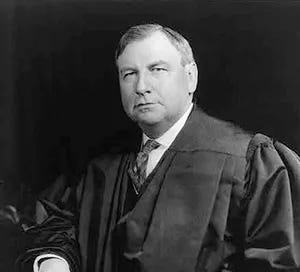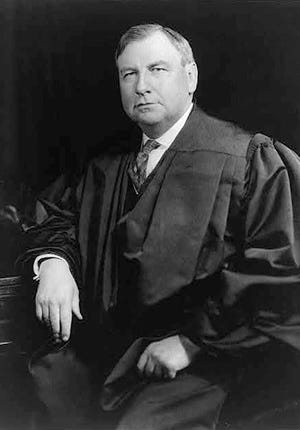This Day in Legal History: United States v. Carolene Products Co. Decided
On April 25, 1938, the U.S. Supreme Court issued its decision in United States v. Carolene Products Co., 304 U.S. 144, a seemingly mundane case about a federal law banning the interstate shipment of “filled milk.” But beneath its surface lay one of the most consequential footnotes in American constitutional history. The Court upheld the statute under a rational basis review, affirming Congress's authority to regulate economic activity. However, in Footnote Four of the majority opinion, Justice Harlan Fiske Stone proposed a bold and lasting idea: not all legislation should be treated equally when it comes to judicial review.
Stone suggested that while economic regulations would generally be upheld if they had a rational basis, laws that appeared to conflict with specific constitutional prohibitions or aimed at "discrete and insular minorities" might require stricter scrutiny. This footnote planted the seed for what would become the modern system of tiered judicial scrutiny—rational basis, intermediate scrutiny, and strict scrutiny—used to assess the constitutionality of laws under the Equal Protection and Due Process Clauses.
Though Footnote Four was not binding, it became one of the most cited and influential passages in constitutional law. It signaled a shift away from the Lochner-era deference to economic liberty and toward more robust judicial protection of civil rights and liberties. The idea that courts have a special role in protecting politically powerless groups fundamentally shaped later decisions in cases involving racial discrimination, free speech, and voting rights.
In this way, a case about dairy regulation became a cornerstone of modern constitutional doctrine. Carolene Products illustrates how even minor legal disputes can produce major legal revolutions—one footnote at a time.
In a rare display of bipartisan unity, the U.S. government is making significant legal advances against Big Tech, with Meta and Google facing tough antitrust scrutiny in simultaneous court cases. In separate proceedings in a Washington federal courthouse, the FTC is attempting to break up Meta, while the DOJ is pressing Google over illegal monopoly practices, including deals to pre-install its AI on smartphones. These efforts reflect years of legal groundwork laid across both the Trump and Biden administrations, showing that concerns over Big Tech’s power and influence transcend party lines—even if the motivations differ. While Democrats emphasize market concentration and data control, Republicans have focused on censorship and political bias. Despite court momentum, legislative action remains stalled, hindered by political polarization and disagreements over broader issues like content moderation and China policy. The bipartisan front could fracture as political dynamics shift, especially with Trump signaling a more cooperative stance toward tech companies–or at least a willingness to extract rents from them.
Meta, Google Hammered in Court in Sign of Rare Left-Right Unity - Bloomberg
The American Bar Association (ABA) laid off over 300 employees after the Trump administration cut $69 million in federal grant funding, according to a new lawsuit filed by the ABA against the Department of Justice. The organization alleges the cuts were politically motivated retaliation for its support of diversity initiatives and criticism of the administration. The terminated grants had funded legal aid programs for domestic violence victims and immigrants, as well as global rule of law initiatives. The layoffs affected about a third of the ABA’s staff, including workers in its South Texas ProBar program and international legal development projects. The DOJ ended the grants shortly after barring its attorneys from participating in ABA events. The ABA is being represented by Democracy Forward in the suit, which also names Attorney General Pam Bondi and Deputy Attorney General Todd Blanche as defendants.
ABA Lays Off 300 Employees, Blaming Trump Grant Funding Cuts (1)
Richard Lawson, the lawyer defending President Trump’s executive orders targeting law firms, has faced repeated courtroom defeats while offering vague, evasive answers under judicial questioning. In four separate cases, courts have temporarily blocked Trump’s orders, which aimed to punish firms like Perkins Coie and WilmerHale for their roles in legal actions against him by revoking security clearances and threatening government contracts. Judges have openly criticized the orders as retaliatory and politically motivated. Despite this, Lawson has often appeared alone in court, prompting speculation that even the Justice Department is reluctant to back the arguments he’s tasked with presenting. His vague responses and visible discomfort have drawn scrutiny, especially given his political ties to Attorney General Pam Bondi and his role at the pro-Trump America First Policy Institute. While some law firms have settled by agreeing to large pro bono commitments, others are pushing forward in court, where permanent injunctions against the executive orders now seem likely.
Trump Attorney for Big Law Attacks Says Little as Losses Rack Up
In a piece for Forbes earlier this week, I argue that the state and local tax (SALT) deduction is fundamentally flawed and difficult to defend. Though often framed as a benefit to the middle class or a protection against double taxation, the deduction overwhelmingly favors wealthy households and creates inequities in the federal tax system. It allows states to impose high taxes without facing full political accountability, effectively outsourcing part of the cost to the federal government. The 2017 cap of $10,000 was a step in the right direction, and data shows that repealing it would benefit primarily the top 20% of earners—not typical working families. Unlike other personal expenses like rent or groceries, which aren’t deductible, SALT gets special treatment without clear justification. If we care about fairness, progressivity, and honest budgeting, it's time to seriously consider scrapping the deduction altogether.
Reconsidering The SALT Deduction: Is It Defensible?
This week’s closing theme is the final section of Finlandia, Op. 26, by the Finnish composer Jean Sibelius, performed here in its piano version. Composed in 1899 during a time of intense political censorship and rising nationalist sentiment, Finlandia was Sibelius’s defiant musical response to Russian oppression. The tone poem was originally part of a series of historical tableaux performed as a protest against censorship, with Finlandia serving as the rousing finale.
While the early passages of Finlandia are turbulent and stormy—meant to evoke struggle—the final section is a striking contrast: serene, solemn, and deeply moving. This lyrical closing, often referred to as the Finlandia Hymn, became an unofficial anthem of Finnish resistance and later a national symbol of unity and perseverance. In this week’s selection, we hear a solo piano arrangement that strips the music to its essence, allowing the melody’s dignity and quiet strength to shine through.
Sibelius once said, “Music begins where the possibilities of language end,” and in Finlandia’s final moments, words do indeed fall away. What remains is a profound expression of hope and resilience—qualities that have made this music resonate far beyond Finland’s borders. Though Sibelius composed in the late Romantic tradition, his voice is unmistakably his own: direct, elemental, and rooted in the landscape and soul of his homeland.
As we close out the week, let Finlandia remind us that even in times of turbulence, grace and resolve can still find their voice.















Share this post